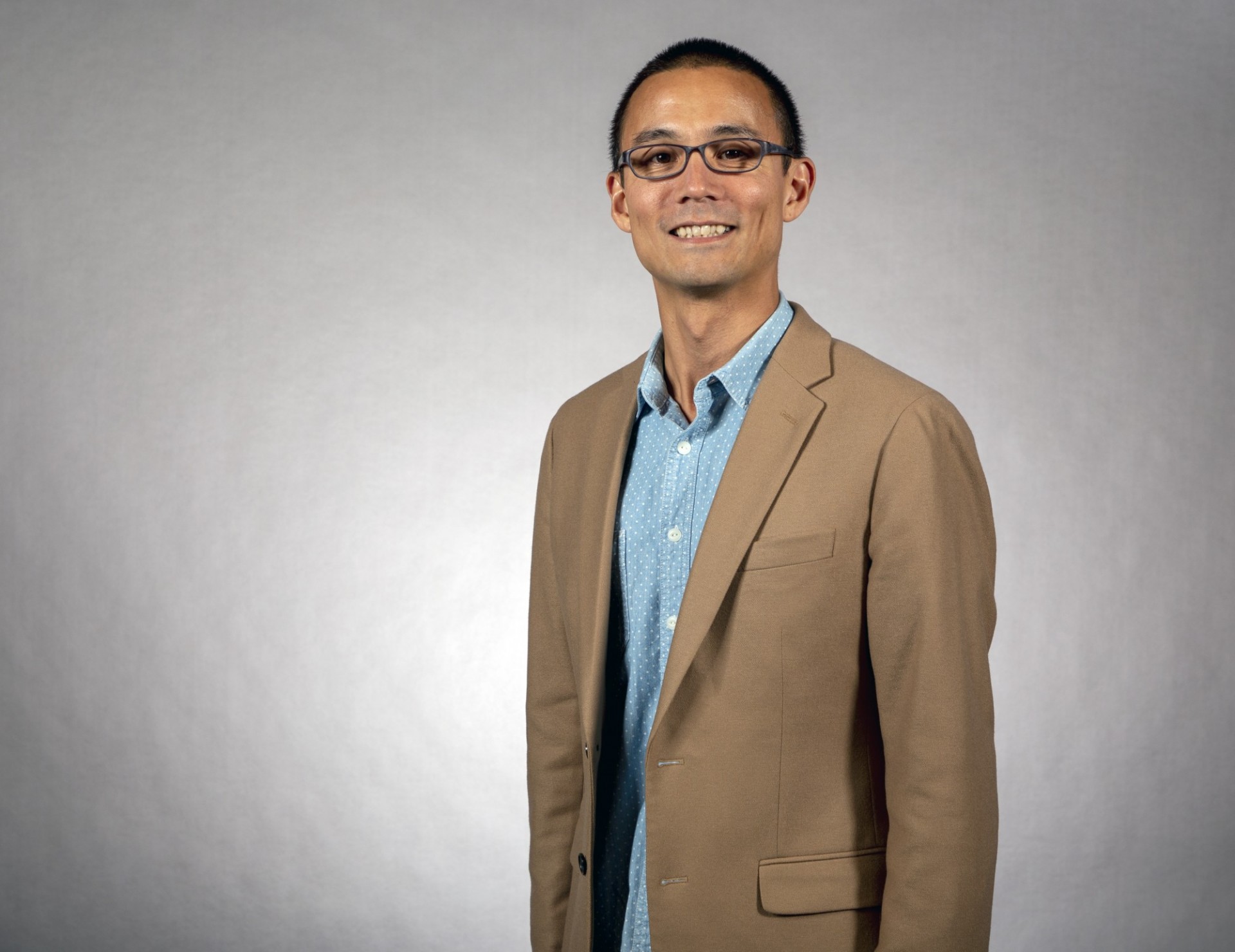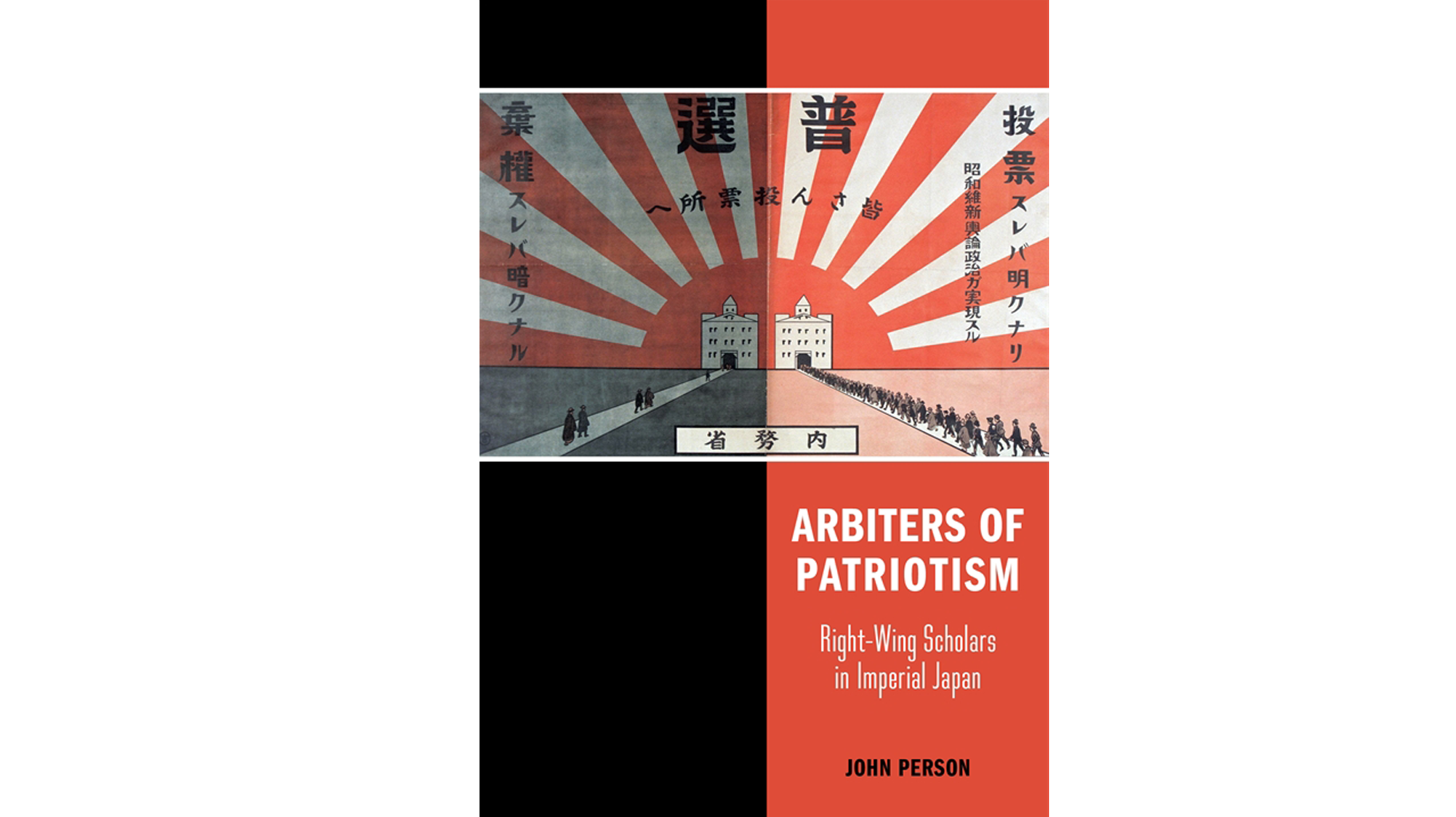WEAI Author Q&A: John Person's 'Arbiters of Patriotism'

We are excited to announce a new title in the Studies of the Weatherhead East Asian Institute book series: Arbiters of Patriotism: Right-Wing Scholars in Imperial Japan published by University of Hawai'i Press. The book’s author, John Person, is assistant professor of Japanese studies at the University at Albany, State University of New York.
In the 1930s and 1940s Marxist academics and others interested in liberal political reform often faced virulent accusations of treason from nationalist critics. In Arbiters of Patriotism, John Person explores the lives of two of the most notorious right-wing intellectuals responsible for leading such attacks in prewar and wartime Japan: Minoda Muneki (1894–1946) and Mitsui Kōshi (1883–1953) of the Genri Nippon (Japan Principle) Society.
As fervent proponents of Japanism, the ethno-nationalist ideology of Imperial Japan, Minoda and Mitsui appointed themselves judges of correct nationalist expression. They built careers out of publishing polemics condemning Marxist and progressive academics and writers, thereby ruining dozens of livelihoods. Person traces Japanism’s rise to literary and philosophical developments in the late-Meiji (1868–1912) and Taisho (1912–1926) eras, when vitalist theories championed emotion and volition over reason. Founding their ideas of nationalism on the amorphous regions of the human psyche, Japanists labeled liberalism and Marxism as misunderstandings of the national particularities of human experience.
For more than a decade, government agents and politicians used Minoda’s and Mitsui’s publications to remove their political enemies and advance their own agendas. But in time they came to regard both men and other nationalist intellectuals as potential thought criminals. Whether collaborating with the government to crush the voices of class struggle or becoming the targets of police surveillance themselves, Minoda and Mitsui came to embody the paradoxically hegemonic yet arbitrary nature of nationalist ideology in Imperial Japan. In this thorough examination of the Genri Nippon Society and its members, Arbiters of Patriotism provides a tightly argued and compelling account of the cosmopolitan roots and unstable networks of Japanese ethno-nationalism, as well as its self-destructive trajectory.
We thank Professor Person for taking the time to discuss his book with us.
Q: Can you first introduce yourself, your research background, and how you became interested in radical nationalism in Japan?
I attended Gustavus Adolphus College in Minnesota as an undergraduate student and had the great fortune to meet Abe Masao, a great scholar of religion who trained under figures associated with the famous Kyoto School of philosophy, when he visited our campus for a semester. I went on to the University of Chicago with the vague idea that I wanted to study Nishida Kitarō and the Kyoto School, but struggled to develop a unique research topic in a field filled with excellent scholars and studies already. While reading Nishida’s letters from the war years, I discovered that he was quite preoccupied with a man named Minoda Muneki, a philosopher that Nishida clearly regarded as a third-rate thinker. Minoda was a professor of philosophy whose vicious polemics contributed to the ruin of many academics. He would essentially accuse fellow academics of being traitors to the nation through a highly acrobatic argumentation. When I read Minoda’s works for the first time, I was floored by how dense and almost impenetrable his writing is. There are so many references to nationalist slogans, poems of emperors, and other details only legible to ardent nationalists, that contemporaries quite understandably called him a fanatic spouting gibberish. As I read more by Minoda and his enemies, I became interested in how such a person came to wield such immense influence in the academy.
Q: Could you offer a brief explainer of right-wing radicalism in imperial Japan? What are the common threads or tenets shared with other right-wing groups, and are there any unique characteristics?
One of the concerns that directed the course of my research was the history of the notion of “right wing.” As I dug around for examples of people using the word “right” in denoting political ideology, I discovered that it began in the late Taisho era around the same time that people like Adolf Hitler and Benito Mussolini were gaining prominence in Europe, and it referred to a kind of antiestablishment ideology that appealed to a sense of primal nationalism rather than class struggle. Japanism, or Nihonshugi, refers to the idea that a Japanese person’s “Japaneseness” is something that is innate in the very life of that person, and it shapes the way that they speak, think, and feel. Japanism was anticommunist in the sense that Japanists believed that communists relied on notions like class, which they believed to be unnatural and inauthentic products of modernity. At the same time, Japanists were antiestablishment in the sense that they were deeply critical of figures in government and finance who they believed were blocking the natural evolution of the Japanese state through their selfish attachment to power and wealth. Japanese police agencies were deeply suspicious of Japanist movements, and they had good reason to be, as there were many assassinations of elite members of society by nationalists moved by a sense of patriotism. In my book I argue that it was the police bureaucrats who normalized the use of “right wing” to refer to nationalist radicals. Japanists themselves rarely referred to themselves as “right wing,” since they believed they embody orthodox nationalism—they are not right-wing; they’re the center! But for police bureaucrats trying to prevent terrorist attacks against the elite, “right wing” denoted a kind of extremism that they differentiated from their other ideological enemy, the left, and the nationalism encouraged by the state. I think it’s helpful to remember that right wing is a directional word that doesn’t denote any kind of ideology on its own. It’s helpful because this helps us in paying attention to what might be taken for granted as the “center” that casts ideas associated with the right and left as extreme or unorthodox.
Q: Who were Minoda Muneki and Mitsui Kōshi, the individuals you focus on in Arbiters of Patriotism?
Both were highly educated intellectuals trained and working in established academic and media institutions. That was actually one of first things that intrigued me as I began my research into their organizations. While Minoda and Mitsui were regarded by their contemporaries and postwar historians as dangerously eccentric fanatics at the margins of intellectual culture, both emerged from mainstream academic and literary currents. Both were graduates of Tokyo Imperial University and Mitsui was one of the leaders of the Negishi Tanka Society after the death of founder Masaoka Shiki, a giant in the history of modern Japanese poetry. Mitsui was also a long-time contributor and poetry editor at Nihon oyobi Nihonjin (Japan and the Japanese), an institution among conservative opinion magazines. Today there is a growing library of excellent studies of nationalist intellectuals and organizations, but when I was beginning my research as a graduate student it seemed like scholars had largely ignored a powerful and important segment of intellectual culture simply because they abhorred their ideas.
Q: In the introduction of Arbiters of Patriotism, you go into great detail about the labeling of Minoda Muneki and Mitsui Koshi as “fanatics.” What makes a “fanatic?” At what point does a nationalist or ideologue cross into “fanatic” territory?
The label of “fanatic” can sometimes serve as an excuse to not investigate something further. If we frame something as fundamentally outside of our capacity to reason, it lets us off the hook in figuring out what people like Minoda were thinking and doing. While I don’t think Minoda and Mitsui’s ideas are that interesting necessarily as ideas, my hope is that my exploration of their careers helps us understand characteristics of nationalist ideas and how they can be deployed for various political ends. I think the label of “fanatic” can sometimes get in the way of productive work.
At the same time, it’s hard to blame contemporaries of Minoda and Mitsui for dismissing them as fanatics. In the introductory chapter of my book, I quote a sentence written by Minoda that takes up seventeen lines on the page. Seventeen! One sentence! There, Minoda is angrily airing his grievances about the academic elite who he accuses of being the root of all evil in Japanese society. Back then, writers would place dots next to words they wanted to emphasize, much like how we use italics. Minoda clearly wanted to emphasize different ideas in different ways, so he used several forms of dots (comma-like dots, circles, double circles, etc.) and he basically emphasized everything. So when you open a book by Minoda, the visual impact of the text can catch you off guard. And the guy was dangerous. If you were an academic caught in the cross hairs of Minoda and friends, you could end up losing your job. Who could blame them for not wanting to engage with them? Still, since it was Minoda’s contemporaries (and targets) who wrote the first accounts of the intellectual history of those years, a more rigorous account of nationalist thought had to come from a different generation of scholars.
Q: What do you hope readers will take away from Arbiters of Patriotism, and are there any lessons that can be applied when characterizing the radical nationalist groups or individuals of today?
There are self-appointed arbiters of patriotism everywhere. What’s less obvious sometimes is the fact that the content of patriotism is itself arbitrary. I think that one of the things that my book effectively shows is that though there were many different political actors (like politicians, bureaucrats, police officers, intellectuals, and the like) clamoring for a more patriotic society, there was little consensus about what that meant. Usually these calls were directed at political enemies, but of course everyone has different political enemies. In the end, “patriotism” is nothing more than a rhetoric designed to frighten people to get with the program. Its very emptiness is what makes it so useful and effective for demagogues.

